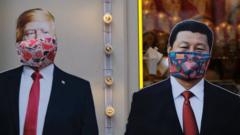Coronavirus: US-China battle behind the scenes
- Published

The coronavirus pandemic has worsened relations between Donald Trump's America and Xi Jinping's China
It is clearly not a good time for the world and it is not a good time for relations between the US and China. President Donald Trump has repeatedly chosen to call the coronavirus the "Chinese virus". His hawkish Secretary of State Mike Pompeo calls it the "Wuhan virus", something that causes huge offence in Beijing.
The president and secretary of state have both denounced China for its failings in the initial handling of the outbreak. But Chinese spokesmen have utterly rejected any idea that they were less than transparent about what was going on. Meanwhile, social media in China has spread stories that the pandemic has been caused by a US military germ warfare programme; rumours that gained considerable traction. Scientists have demonstrated that the virus structure is entirely natural in origin.
But this is not just a war of words, something more fundamental is going on.
Earlier this month, when the US announced that it was closing its borders to travellers from many EU countries, including Italy, the Chinese government announced that it was sending medical teams and supplies to Italy, the country at the leading edge of the coronavirus pandemic. It has sent help to Iran and Serbia too.
It was a moment of huge symbolism. And it was an indication of the information battle that is being waged behind the scenes, with China eager to emerge from this crisis with renewed status as a global player. Indeed, it is a battle which the US - at the moment - is losing hands down. And the belated despatch of a small mobile US Air Force medical facility to Italy is hardly going to alter the equation.

China has sent medics and equipment to help other stricken countries
This is a moment when the administrative and political systems of all countries are being stress-tested like never before. Leadership will be at a premium. Existing political leaders will ultimately be judged by how they seized the moment; the clarity of their discourse; and the efficiency with which they marshalled their countries' resources to respond to the pandemic.
The pandemic has hit at a time when US-China relations were already at a low ebb. A partial trade deal has barely plastered over the commercial tensions between the two countries. Both China and the US are re-arming, openly preparing for a potential future conflict in the Asia-Pacific. China has already emerged, at least in regional terms, as a military super-power in its own right. And China now is eager for the wider status that it believes its international position requires.
The pandemic then threatens to pitch US-China relations into an even more difficult period. This could have an important bearing upon both the course of this crisis and the world that emerges from it. When the virus is defeated, China's economic resurgence is going to play a critical role in helping to rebuild the shattered global economy.
But for now, Chinese assistance is essential in combating the coronavirus. Medical data and experiences need to continue to be shared. China is also a huge manufacturer of medical equipment and disposable items like masks and protective suits, essential to handling infected patients and items that are required in astronomical numbers.
China is in many ways the medical manufacturing workshop of the world, capable of expanding production in ways few other countries can. China is seizing an opportunity but, according to many of President Trump's critics, it is he who has dropped the ball.
This video can not be played
To play this video you need to enable JavaScript in your browser.
How does America see its relationship with China?
The Trump administration initially failed to accept the seriousness of this crisis, seeing it as another opportunity to assert "America First" and the supposed superiority of its system. But what is at stake now is global leadership.
As two Asia experts, Kurt M Campbell - who served as assistant secretary of state for East Asian and Pacific affairs in the Obama administration - and Rush Doshi, note in a recent article for Foreign Affairs: "The status of the United States as a global leader over the past seven decades has been built not just on wealth and power but also, and just as important, on the legitimacy that flows from the United States' domestic governance, provision of global public goods, and ability and willingness to muster and coordinate a global response to crises."
The coronavirus pandemic, they say, "is testing all three elements of US leadership. So far, Washington is failing the test. As Washington falters, Beijing is moving quickly and adeptly to take advantage of the opening created by US mistakes, filling the vacuum to present itself as the global leader in pandemic response."

A SIMPLE GUIDE: What are the symptoms?
AVOIDING CONTACT: Should I self-isolate?
LOOK-UP TOOL: Check cases in your area
MAPS AND CHARTS: Visual guide to the outbreak

It is easy to be cynical. Many might wonder how China could seek advantage at this time - Campbell and Doshi call it "Chutzpah" - given that it is in China that this pandemic appears to have originated. Beijing's initial response to the developing crisis in Wuhan was secretive. However, since then, it has marshalled its vast resources effectively and impressively.
As Suzanne Nossel, the CEO of the press freedom organisation PEN America, writes in an article on the Foreign Policy website: "Fearful that the initial denial and mismanagement of the outbreak could trigger social unrest, Beijing has now mounted an aggressive domestic and global propaganda campaign to tout its draconian approach to the epidemic, downplay its role in sparking the global outbreak, and contrast its efforts favourably against those of Western governments and particularly the United States."
Many western commentators see China becoming more authoritarian and more nationalist and fear that these trends will be accelerated by the impact of the pandemic and the resulting economic slowdown. But the impact upon Washington's global standing could be even greater.

Xi Jingping is keen to secure China's reputation on the global stage
America's allies are taking note. They may not criticise the Trump administration openly, but many have clear differences with it over attitudes to China; the security of Chinese technology (the Huawei controversy); and over Iran and other regional issues.
China is using its outreach on the pandemic to try to establish the parameters for a different relationship in the future - one perhaps where China fast becomes the "essential power". Link-ups in the counter-coronavirus campaign with its near neighbours - Japan and South Korea - and the provision of vital health equipment to the EU, can be seen in this light.
Campbell and Doshi, in their Foreign Affairs piece, make an explicit comparison with Britain's decline. They say that the botched British operation in 1956 to seize the Suez Canal "laid bare the decay in British power and marked the end of the United Kingdom's reign as a global power".
"Today," they say, "US policymakers should recognize that if the United States does not rise to meet the moment, the coronavirus pandemic could mark another 'Suez moment'."
- Published23 February 2020
- Published8 November 2019
- Published20 March 2020
- Published25 March 2019


